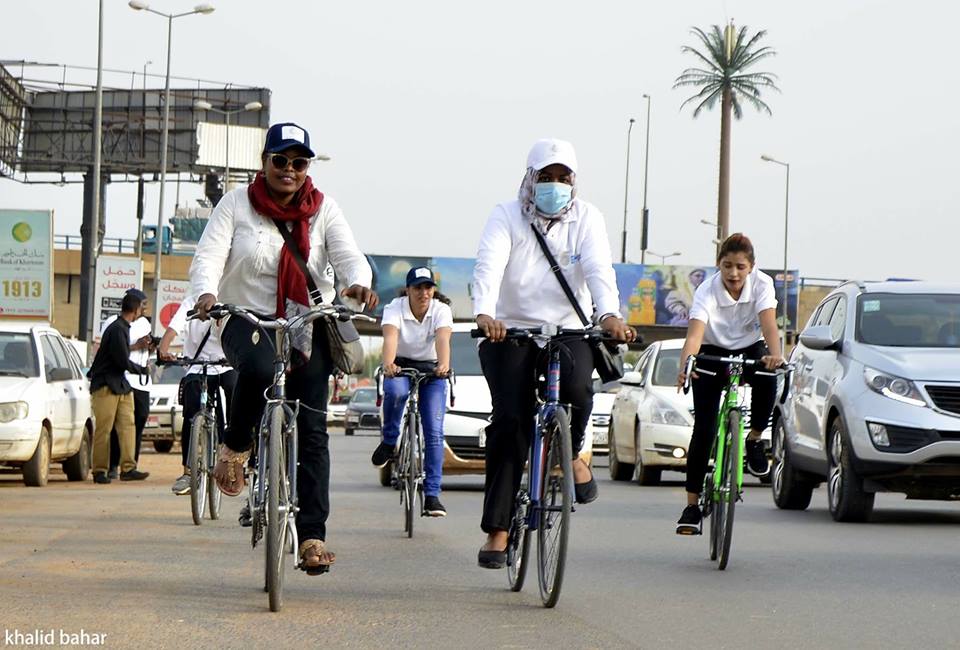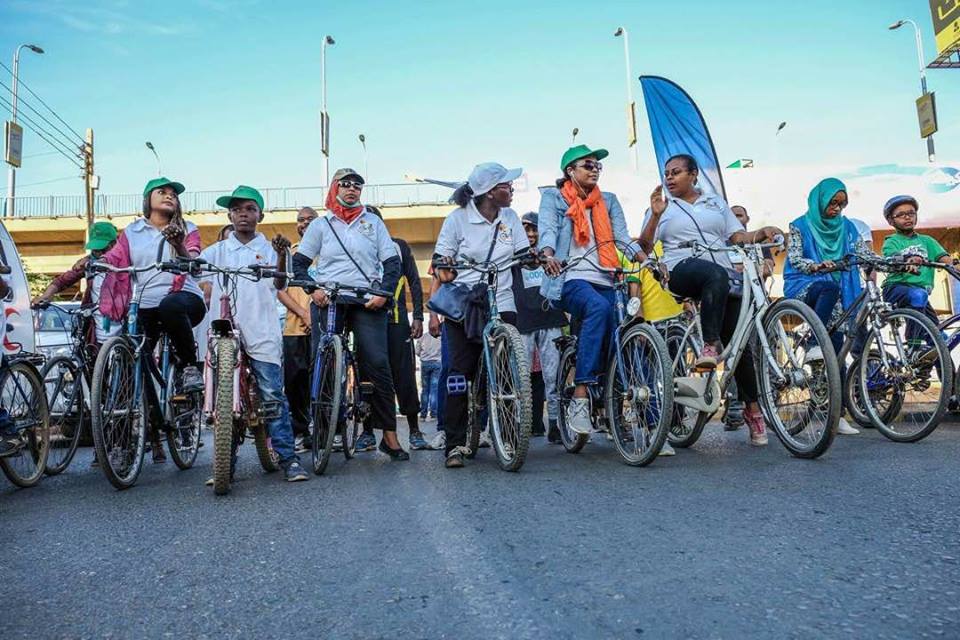Remembering Enass Muzamil: Pioneering the Path to Equality on the Wheels of a Bicycle
On Sunday the 4th of February we lost, Enass Muzamil, a community leader, founder of the Sudanese Female Cyclist Initiative, and dear friend of the SIHA Network and Women in Islam Editorial Teams. Her dedication to breaking societal norms and promoting women’s rights will forever be remembered as a beacon of inspiration.
While working in the Netherlands in 2013, Enass was inspired by the cycling culture there. She immediately recognized the potential of bicycles as a means of transportation, especially for women in urban environments like Khartoum. Her childhood love for cycling was rekindled, driving her to establish the Sudanese Female Cyclist Initiative upon her return.
In a society where traditional values had curtailed the freedom of women, Enass dared to challenge the status quo. Her initiative started small, with just a few bicycles and weekly meetings at Green Yard, the largest park in Khartoum. The response on social media surpassed all expectations, garnering international attention from media outlets such as Al-Jazeera, Al-Arabiya, MBC, and the BBC.
Enass faced challenges, both online and on the streets of Khartoum. Negative reactions and verbal harassment were unfortunately part of the journey, but she remained resolute. The initiative soon gained momentum, attracting not only public figures, artists, and activists but also the support of women who sought a positive change in society.
Enass felt that the success of the Sudanese Female Cyclist Initiative, lay in its ability to cater to the needs of young middle-class women in Khartoum. Beyond cycling, the club became a platform for women to meet in public spaces, fostering a sense of protection and solidarity against harassment. Enass believed that this constructive approach, which promotes women’s rights and environmental protection, resonated with Sudanese culture rather than opposing it.
Enass’s legacy will forever live on as a symbol of empowerment, resilience, and breaking barriers. Her passion for cycling, women’s rights, and environmental consciousness can never be erased.
Cycling on the Road to Equality – An Interview with Enass Muzamil, Founder of the Sudanese Female Cyclist Initiative
Although women have been driving cars in Sudan since the 1950s, social norms still prevent them from cycling. With the rise of political Islam in the country, women have increasingly been excluded from public spaces as the list of “indecent” or “morally unacceptable” behaviours and attire continues to grow. A few Sudanese women, however, are reclaiming the busy streets of Khartoum and other Sudanese cities by riding bicycles thereby breaking the norms and traditions of Sudan’s conservative society. Enass Muzamil, a 29-year-old woman who studied at Khartoum University and currently works for UN Environment, is the founder of the Sudanese Female Cyclist Initiative. In an interview with SIHA, Muzamil tells us about the origins, challenges and future of the female cyclist movement she began.
How did you come up with the idea of starting a cycling club?
It all started in 2013 when I traveled to Holland for professional purposes. As soon as I left the airport, I saw so many people on bikes – men, children and also women. Holland has a biking culture. There are bicycles parked everywhere in the streets and special bike lanes beside the roads. Every morning, hundreds of adults and children cycle to work and school, regardless of weather conditions. During a second visit to Holland, I started cycling myself. I went to a course designed for immigrant women to learn how to ride a bicycle. It took some women months to learn how to cycle, but I picked it up very fast, probably because I used to ride a bike during my childhood.
While in Holland, I started thinking about cycling opportunities in Sudan. Bikes are a great means of transportation in overpopulated urban environments like Khartoum. It is cheap, does not take up a lot of space, and does not pollute the environment or make noise. It is also a great way for women to improve their health and move short distances.
You mentioned that you were riding a bicycle as a child, why did you stop?
As a little girl, I had a beautiful red bicycle. I loved it and was very proud of it. But when I was 12-years-old, the bike was taken away from me. It was considered inappropriate for a teenage girl to ride a bike. I was very angry and felt it was unfair. It made me painfully aware of the difference in treatment between boys and girls in Sudan’s society. My cherished bike was given to a cousin, who did not look after it. I remember that when we visited him a few months later, I saw the bicycle lying around in a poor condition and felt sad.
How did you translate your idea for a female cyclist initiative into reality?
When I came back to Khartoum, after my trip to Holland, I bought myself a bicycle. It was challenging, since ladies’ bikes are not easily accessible in Sudan. Once purchased, I took the bicycle together with my sister and little nephew to the Green Yard, the biggest park in the city.
Through my work in Holland for the Radio Netherlands Worldwide, I had become acquainted with online advocacy. So, I established a Facebook page titled ‘Sudanese Female Cyclist Initiative’ and posted a few pictures of female friends and myself on the bike. The response was beyond all our expectations. In a few days, the page received more than a thousand likes and reached three thousand likes a few weeks later. Through the page, we started to organize weekly meetings at the Green Yard. Sometimes more than 150 women would turn up. At this time, we had only three bicycles and had to take turns to teach each other how to cycle.
Reactions to your initiative on Facebook were positive. What were the reactions of the media and the general public?
Generally, our initiative was welcomed by the public. From the beginning, we received a lot of attention from local and international media, including Al-Jazeera, Al-Arabiya, MBC and the BBC. Numerous articles about us were published in Sudanese newspapers and I was asked to participate in national TV talk shows on women in sports. We also received lots of support from Sudanese public figures, artists, football players, women activists, etc.
But in the parks and streets of Khartoum where we practice biking, reactions are mixed. People are often surprised to see young ladies on bicycles. Sometimes, reactions are negative and we were verbally harassed.
Can you talk about the forms of harassment you usually experience?
Most negative comments come from men, but some women are also very critical. We try to ignore them. It is natural and understandable since we are doing something new that goes against the norm. Change needs time. In just a few months, people have already gotten used to see women cycling in the park. And it’s not all negative. We also get a lot of encouragement from people giving us a ‘thumbs up’ and all kinds of help and advice. Some women even stop their cars to ask how they can contact us to join!
How do you explain the success of the initiative?
Part of the success comes from the fact that we are catering for a need among young middle-class women in Khartoum. The club offers women the opportunity to meet outside and in public, and while verbal harassment cannot be prevented completely, women feel protected cycling together in a group. Young women like to do sports, but almost all the sports activities in Khartoum are indoor and usually quite expensive.
The women who have joined the initiative are also enthusiastic about bringing a positive contribution to society. We do not only cycle, we also organise events to raise awareness about the environment and encourage people to take responsibility so that we can all enjoy clean, green and safe public spaces. In our philosophy, solving environmental issues starts with each and everyone’s commitment to protecting her or his direct environment.
I think the secret of our success is that we are promoting women’s rights and environmental protection in a constructive way that does not offend the cultural sensitivities of most Sudanese people. We are not opposing Sudanese culture. We feel that we are representing it, by being simple and taking care of our environment.
What are your plans for the future?
We are an independent association surviving on the donations from members. At the moment, however, a lack of adequate funding is inhibiting our expansion. Through the Dutch embassy, the Dutch organization “Give a Bike” donated five brand new bicycles to our cause. But we need more bikes, a clubhouse to store them, and perhaps also a few part-time professionals hired to train our members and organise activities. Despite the challenges, we feel optimistic as the number of women joining the club grows every day
This article was compiled by Women in Islam.



No comment